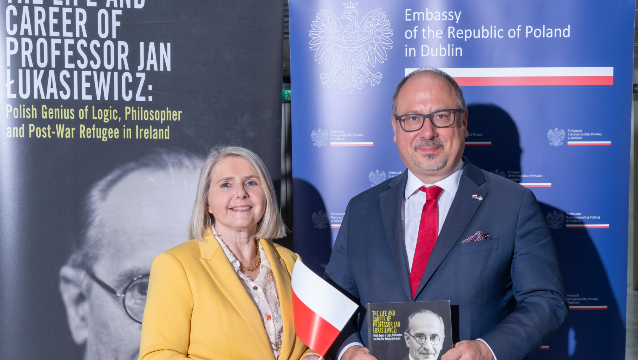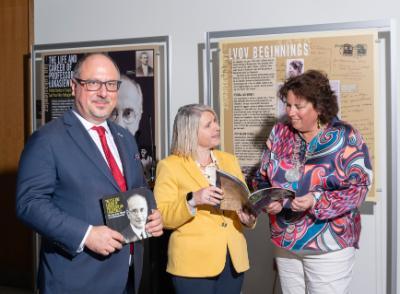In This Section
New exhibition at UCC explores the Irish connections of esteemed Polish genius

- New exhibit celebrates life of Professor Jan Łukasiewicz, Polish genius of Logic, philosopher, and post-war refugee in Ireland.
- Ambassador-Designate of the Republic of Poland to Ireland, His Excellency Professor Arkady Rzegocki attends exhibition launch.
- “He was a refugee like the Ukrainians today”.

Prof Sarah Culloty, Head, College of Science, Engineering and Food Science, UCC , Ambassador-Designate of the Republic of Poland to Ireland, His Excellency Professor Arkady Rzegocki and Cllr Audrey Buckley, Deputy Mayor of County Cork Pictured at the launch of a new exhibition celebrating the life of Professor Jan Łukasiewicz, Polish genius of Logic, philosopher, and post-war refugee in Ireland.
A new exhibition at UCC will allow audiences to discover the captivating life and career of Professor Jan Łukasiewicz, Polish genius of Logic, philosopher, and post-war refugee in Ireland.
The exhibition presented by the Embassy of the Republic of Poland in Dublin and hosted by UCC explores the fascinating life and achievements of one of the twentieth century's brightest minds in European science.
Professor Jan Łukasiewicz, one of the leading figures in the field of logic and author of more than 50 academic works in the fields of mathematical logic and philosophy, became destitute because of the Second World War and was subsequently offered to rebuild his life and academic career in Ireland.
His life was entwined with the tragic fate of his beloved country, Poland, and he was actively involved in reviving Polish education and science in the inter-war period (1918-1939). The Second World War destroyed nearly all his scientific manuscripts, and the threat of a Communist regime forced him to flee his home country.
Professor Łukasiewicz accepted an offer of settlement and employment from the Irish State with gratitude and relief. Ireland gave him a home and the opportunity and resources to advance his scientific research and publish one of the most important books of his career.
His Irish story was part of an extraordinary and forgotten effort of the Irish state, especially UCC and other universities, to help refugee Poles. It is a story of assistance and acceptance of foreign nationals in post-war Ireland driven by the efforts of UCC’s then-President Professor Alfred O’Rahilly and his vision for human solidarity.
His Excellency Prof Arkady Rzegocki, Ambassador-Designate of the Republic of Poland to Ireland, who attended the exhibition launch, said:
I am honoured to be partnering with University College Cork in order to tell the story of one of Poland’s most renowned philosophers and logicians of the 20th century to the local community in Cork this October. Professor Łukasiewicz is a very important figure for Poland, not just as an academic, but a true patriot and statesman. Unable to return home, he was invited to come to Ireland by the then Taoiseach Eamon de Valera and to pursue his academic career, which is a great example of very strong ties between our two countries. He was a refugee like the Ukrainians today, who, as a result of Russia's brutal and unprovoked aggression, seek refuge in Poland and Ireland, among other places. Just as Professor Łukasiewicz was once able to continue his academic career in Ireland, thousands of Ukrainian teachers, students and lecturers can today work peacefully in both our countries.
I hope that the people of Cork will enjoy this exhibition and learn even more about Poland as well as Polish history and science.
Professor Sebastian M. Wieczorek, School of Mathematical Sciences, UCC said:
Professor Łukasiewicz was a highly distinguished Logician and Philosopher whose achievements span across different areas of science and beyond. These include his groundbreaking work on multi-valued logic and practical applications to the development of modern Computer Science, programming languages that use his elegant mathematical notation known today as the Polish notation, and more generally, our everyday interactions with modern technology
The content of this exhibition is prepared by leading experts in the field and accompanied by a variety of photographs, manuscripts, and rarely seen documents drawn from various archives in Ireland and in Poland.
The exhibition will be officially opened by Professor Sarah Culloty, Head, College of Science, Engineering and Food Science, UCC and the Ambassador-Designate of the Republic of Poland to Ireland, His Excellency Professor Arkady Rzegocki, on 3 October in the atrium of the Western Gateway Building, University College Cork, and will run for four weeks.
Photo Credit: Gerard McCarthy
College of Arts, Celtic Studies & Social Sciences
Coláiste na nEalaíon, an Léinn Cheiltigh agus na nEolaíochtaí Sóisialta
Contact us
College Office, Room G31 ,Ground Floor, Block B, O'Rahilly Building, UCC
